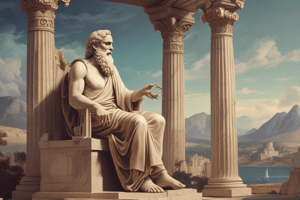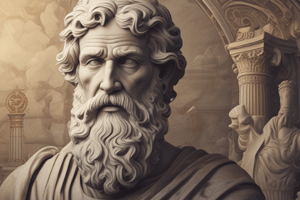Podcast
Questions and Answers
What part of the soul does Plato identify as the source of emotions such as love and ambition?
What part of the soul does Plato identify as the source of emotions such as love and ambition?
- Will (correct)
- Perception
- Appetite
- Reason
According to Aristotle, what is necessary for achieving 'eudaimonia'?
According to Aristotle, what is necessary for achieving 'eudaimonia'?
- Conforming to social standards
- Relying solely on reason
- Balanced development of faculties (correct)
- Developing the appetite
What metaphor does Plato use to describe the relationship between reason, will, and appetite?
What metaphor does Plato use to describe the relationship between reason, will, and appetite?
- A river and its flow
- A tree with branches
- A balance scale
- A charioteer and horses (correct)
How does Aristotle define the soul?
How does Aristotle define the soul?
What is the role of self-awareness in Aristotle's philosophy?
What is the role of self-awareness in Aristotle's philosophy?
What is St. Augustine's view on the self?
What is St. Augustine's view on the self?
What does Plato emphasize about the soul's relationship to knowledge?
What does Plato emphasize about the soul's relationship to knowledge?
Which aspects does Aristotle believe need to be developed for a good life?
Which aspects does Aristotle believe need to be developed for a good life?
What is the primary goal of philosophy according to Socrates?
What is the primary goal of philosophy according to Socrates?
According to Plato, what are the two components of the self?
According to Plato, what are the two components of the self?
How does Aristotle define the soul?
How does Aristotle define the soul?
What method does Socrates believe is essential for self-knowledge?
What method does Socrates believe is essential for self-knowledge?
How does Plato view the role of the rational soul?
How does Plato view the role of the rational soul?
What does Aristotle suggest is necessary for personal growth?
What does Aristotle suggest is necessary for personal growth?
Which statement would St. Augustine likely support?
Which statement would St. Augustine likely support?
What aspect of the self did Socrates believe contributed most to an individual's happiness?
What aspect of the self did Socrates believe contributed most to an individual's happiness?
What philosophical approach did Augustine take regarding the self?
What philosophical approach did Augustine take regarding the self?
How did Descartes define the self?
How did Descartes define the self?
What are the two parts Plato believes the self is composed of?
What are the two parts Plato believes the self is composed of?
What does 'Cogito ergo sum' mean?
What does 'Cogito ergo sum' mean?
Which metaphor does Plato use to explain the dynamics of the soul?
Which metaphor does Plato use to explain the dynamics of the soul?
What did Augustine emphasize about human nature?
What did Augustine emphasize about human nature?
What aspect did Descartes emphasize in his philosophy?
What aspect did Descartes emphasize in his philosophy?
What does Aristotle believe is essential for moral and intellectual growth?
What does Aristotle believe is essential for moral and intellectual growth?
In Aristotle's view, how does the soul relate to the body?
In Aristotle's view, how does the soul relate to the body?
According to Augustine, what is essential for redemption?
According to Augustine, what is essential for redemption?
What did Descartes believe about the mind and body?
What did Descartes believe about the mind and body?
What is the term used by Aristotle to describe a state of human flourishing?
What is the term used by Aristotle to describe a state of human flourishing?
What does Plato assert is the locus of true knowledge?
What does Plato assert is the locus of true knowledge?
What struggle did Augustine acknowledge in understanding the self?
What struggle did Augustine acknowledge in understanding the self?
Which aspect does Aristotle emphasize as important for the integration of the self?
Which aspect does Aristotle emphasize as important for the integration of the self?
What can occur when reason, appetite, and will are not in harmony according to Plato?
What can occur when reason, appetite, and will are not in harmony according to Plato?
Who is often considered the father of Western philosophy?
Who is often considered the father of Western philosophy?
What is the main purpose of self-reflection according to Socrates?
What is the main purpose of self-reflection according to Socrates?
Which of the following best captures Socrates' famous declaration regarding life?
Which of the following best captures Socrates' famous declaration regarding life?
What does Socrates mean by 'Know thyself'?
What does Socrates mean by 'Know thyself'?
According to Socrates, what is necessary to achieve self-knowledge?
According to Socrates, what is necessary to achieve self-knowledge?
What aspect of mastery does Socrates suggest requires strength?
What aspect of mastery does Socrates suggest requires strength?
What does Socrates believe self-knowledge eradicates?
What does Socrates believe self-knowledge eradicates?
What is regarded as the consummation of self-knowledge in Socratic philosophy?
What is regarded as the consummation of self-knowledge in Socratic philosophy?
What was Socrates' main goal in philosophy?
What was Socrates' main goal in philosophy?
How did Plato define the soul?
How did Plato define the soul?
What did Aristotle believe about the soul?
What did Aristotle believe about the soul?
How did St. Augustine view human nature?
How did St. Augustine view human nature?
What was Descartes' perspective on the mind and body?
What was Descartes' perspective on the mind and body?
What is the relationship between the soul and knowledge according to Plato?
What is the relationship between the soul and knowledge according to Plato?
What did Socrates encourage individuals to seek?
What did Socrates encourage individuals to seek?
What struggle did St. Augustine emphasize in human nature?
What struggle did St. Augustine emphasize in human nature?
What did Socrates famously declare about self-examination?
What did Socrates famously declare about self-examination?
What is emphasized as a critical component in the pursuit of truth according to Socrates?
What is emphasized as a critical component in the pursuit of truth according to Socrates?
What does 'Know thyself' imply in the context of philosophy?
What does 'Know thyself' imply in the context of philosophy?
According to Socrates, what does mastery of the self require?
According to Socrates, what does mastery of the self require?
How does Socrates suggest individuals achieve self-knowledge?
How does Socrates suggest individuals achieve self-knowledge?
What is stated as the result of self-knowledge according to Socrates?
What is stated as the result of self-knowledge according to Socrates?
What is the ultimate goal of philosophy as described in the content?
What is the ultimate goal of philosophy as described in the content?
What does Socrates encourage individuals to do with their beliefs and values?
What does Socrates encourage individuals to do with their beliefs and values?
Flashcards are hidden until you start studying
Study Notes
Socratic Philosophy
- Known as the father of Western philosophy, Socrates stated, "the unexamined life is not worth living."
- Emphasized self-reflection and critical thinking as essential for pursuing truth and wisdom.
- Encouraged questioning of beliefs, values, and assumptions through dialogue for deeper self-understanding.
- Advocated for the idea of "Know thyself" as the ultimate goal of philosophy.
- Stressed that self-knowledge eradicates misery and leads to enlightenment.
- The Socratic Method involves dialogue and inquiry between the soul and itself or between teacher and student.
Platonic Philosophy
- Plato viewed the self as consisting of a rational soul and irrational appetites.
- Compared the soul to a charioteer driving a chariot, with reason guiding the will and desires.
- Argued true knowledge arises from the rational soul’s pursuit of truth and virtue.
- Adopted a dualistic perspective differentiating between the immaterial mind (soul) and the material body.
- Asserted that the soul is the locus of true knowledge, existing before birth and after death.
- Identified three components of the soul: reason, appetite (physical urges), and will (emotion, passion).
- Proposed that mental conflict occurs when these components are not in harmony.
Aristotelian Philosophy
- Aristotle described the self as a harmonious integration of reason, emotion, and perception.
- Advocated for eudaimonia (flourishing) through balanced development of these faculties.
- Highlighted self-awareness as crucial for moral and intellectual growth.
- Defined the soul as the essence of a living being, directly tied to the body’s activities.
- Proposed that the soul cannot exist separately from the body; it is an activity reflecting the body’s essence.
- Used metaphors, such as a knife’s activity of cutting, to illustrate the soul's connection to function and purpose.
Saint Augustine's Contributions
- Integrated Christian theology with philosophical inquiry, focusing on the nature of the self.
- Believed that original sin flawed human nature but that redemption is possible through faith and grace.
- Emphasized moral transformation, repentance, and adherence to divine commandments.
- Highlighted the internal struggle between earthly desires and spiritual fulfillment.
René Descartes' Perspective
- Proposed dualism, separating the mind from the body, distinguishing their functions.
- Famous assertion "I think, therefore I am" emphasizes consciousness as the foundation of self.
- Argued that while mind and body coexist, they operate independently and serve unique purposes.
- Encouraged the use of reason and personal investigation for self-development and understanding.
Major Themes
- The interplay of reason, emotion, and perception in understanding the self is a cornerstone in philosophical discourse.
- Importance of self-knowledge and reflection as a means for achieving a fulfilled and enlightened life.
- Exploration of the soul's essence leads to different interpretations regarding the relationship between the self and the body.
Studying That Suits You
Use AI to generate personalized quizzes and flashcards to suit your learning preferences.




